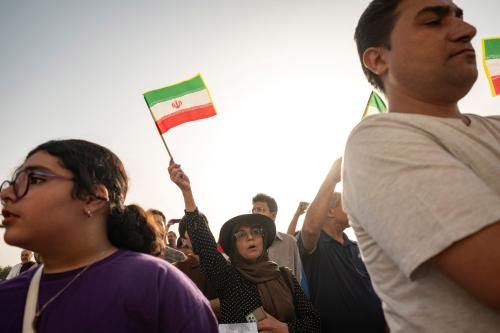Earlier this week there was agreement at the UN Security Council over a presidential statement reaffirming the clauses of Security Council Resolution 1559 approved in September and calling for the withdrawal of all foreign forces from Lebanon. This has forced Syria to face a critical decision: either to maintain its military presence in Lebanon and deny it is an “occupier,” or pursue a new path aimed at respecting its neighbor’s sovereignty.
The initial signs have not been good: Instead of abiding by UN demands, both Beirut and Damascus have embarked on a naive diplomatic mission aimed at convincing the international community that Syrian-Lebanese relations are an “internal” matter outside the prerogative of the United Nations.
Such a response underlines that official circles in Lebanon and Syria must change their thinking if the two countries are to resolve their problems peacefully. Instead of grumbling against foreign meddling, both governments would be better served by pursuing a strategy meant to resolve the issues that are the main cause for outside interference. The hallmarks for such a strategy should include:
- Acknowledging the fact that the current policies no longer serve the long-term interests of both Syria and Lebanon and are indeed driving a wedge between the peoples of the two countries.
- Allowing for a thorough re-evaluation of existing political and economic policies by embarking on a meaningful dialogue with members of the opposition and other civil society actors in both countries. This dialogue would also allow opposition forces to see their legitimate concerns addressed, after a long period in which these have been ignored.
- Initiating the necessary administrative and bureaucratic reforms meant to empower average citizens in both countries and allowing for the expansion of decision-making processes.
- Limiting the ability of the security services to interfere in civil affairs and in shaping the existing ties between both countries.
- Implementing UN resolutions calling for respect of Lebanon’s independence and sovereignty.
- Establishing formal diplomatic relations between Lebanon and Syria.
- Releasing all political prisoners in Syrian jails, especially since there is no valid “security threat” that justifies their continued incarceration.
- Enforcing the rule of law and ending the influence of the intelligence and political apparatuses over the countries’ judicial systems.
All these steps are achievable. What is required is a courageous political stand to do what is right—regardless of how severe, painful and unpleasant the impact might be in an initial phase.
The ability of leading political cadres in Lebanon and Syria to survive depends in no small part on their willingness to accommodate and lead inevitable change, even if this is drastic. Leaders who demonstrate their ability to effectively address their countries’ problems are more capable of galvanizing international support for their own positions and causes. Unfortunately, due to their intransigence and a reluctance to rectify the imbalanced Syrian-Lebanese relationship and the impact of their behavior on regional matters, both countries have paved the way for foreign intervention.
The crisis between the two nations should have been resolved amicably within the framework of the Arab community long before passage of Resolution 1559. The longer problems are left unresolved, the more likely foreign involvement will become a norm rather than an exception. Apparently, leaders in Beirut and Damascus have not yet learned that lesson. This is clear from their current strategy of awaiting the outcome of the American presidential election before deciding on a constructive plan of action. Instead of making positive progress in matters affecting them, they continuously place themselves in the embrace of “foreign developments” while simultaneously rejecting “foreign involvement.”
It is in both countries’ interest to normalize their bilateral relations, thus facilitating normalization of their relations with the rest of the world and possibly helping to jump-start the stalled negotiations with Israel. Embarking on a path of confrontation with the international community will lead to serious consequences. Accommodation, on the other hand, permits a peaceful transition to a relationship based on mutual respect and trust.
The people of Lebanon and Syria have faced many challenges—wars, economic hardship and international isolation. But enough is enough. The time for sacrificing is over. It is about time they started to collect on the dividends of peace and stability. It is about time that they joined the rest of the world in the long-promised march toward progress, prosperity and democracy.
The Brookings Institution is committed to quality, independence, and impact.
We are supported by a diverse array of funders. In line with our values and policies, each Brookings publication represents the sole views of its author(s).



Commentary
Op-edSyrian-Lebanese Relations: The Time for Sacrificing Is Over
October 22, 2004